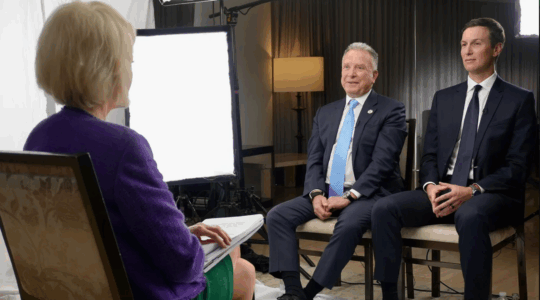JERUSALEM (JTA) – If mapping the human genome was the seminal biological work of the 20th century, then learning how to “read” those genes will define this century, says one of Israel’s top cancer researchers as he tinkers in his lab surrounded by tiny plastic tubes of DNA.
“What is really important is how genes are developed,” says Howard Cedar, a U.S.-born scientist at the Hebrew University and Hadassah Medical School.
Cedar recently won the prestigious Wolf Prize in Medicine – Israel’s equivalent of a Nobel Prize – for his work on how genes become active and inactive during the normal development of cells and how this process is compromised in cells that become cancerous.
He is among hundreds of Israeli scientists whose research has been supported by the Israel Cancer Research Fund, a charitable organization funded predominately by North American Jews that aims to keep Israeli researchers in the country performing cutting-edge research instead of losing them in a “brain drain” to institutions abroad with more money and resources.
Since its launch in 1975, the fund has awarded some $35 million in research grants. Among its longtime grantees are Israel’s 2004 Nobel Prize winners in chemistry, Dr. Aaron Ciechanover and Dr. Avram Hershko.
In Israel the issue of money is especially crucial because government funding for basic cancer research is more limited than in the United States, where many of Israel’s leading scientists move.
Substantial U.S. government funding is one of the main reasons labs in the United States produce such strong research, says Dr. Yashar Hirshaut, the Israel Cancer Research Fund’s chairman and a leading American oncologist.
Hirshaut says the fund’s money can mean the difference between a promising Israeli post-doctoral researcher staying in America or returning to Israel.
“We choose with our limited funds the very best science,” he said. “We are creating a marketplace for ideas.”
Hirshaut argues that research dollars go further in Israel than in the United States because of lower overhead costs. That, he says, has helped make Israel a center for cancer research.
“For every dollar they give they get three times as much as in the United States,” he said.
Another reason Israel is fertile ground for high-quality research, Hirshaut says, is the questioning and skepticism that is part of the culture.
Several important cancer drugs have emerged from Israel.
Doxil, a drug approved by the U.S. Food and Drug Administration that is used in the treatment of a form of cancer related to AIDS, as well as breast and ovarian cancer, was developed by Dr. Alberto Gabizon of the Oncology Institute of Shaare Zedek hospital in Jerusalem.
Gleevac, which treats the myelogenous form of leukemia and a rare form of stomach cancer, was developed in Israel. So was Velcade, which treats multiple myeloma, a disorder of the plasma cells.
All were funded with grants from the Israel Cancer Research Fund.
Moshe Oren, a fund grantee from the Weizmann Institute of Science, discovered the location and revealed the nature of the gene p53, which halts tumors before they grow. A damaged p53 gene is involved in the formation of 60 percent of cancers. Oren’s research is being used by more than 2,000 scientists around the world who are seeking clinical uses for his discovery, according to the Research Fund.
Oren says he has continued his research on the p53 gene at the Weizmann Institute after completing his post-doctoral work in the United States.
“Very little was known about p53, and most people did not appreciate its significance and the need to support research on it,” he said. “The only agency to offer support was the ICRF.”
JTA has documented Jewish history in real-time for over a century. Keep our journalism strong by joining us in supporting independent, award-winning reporting.





